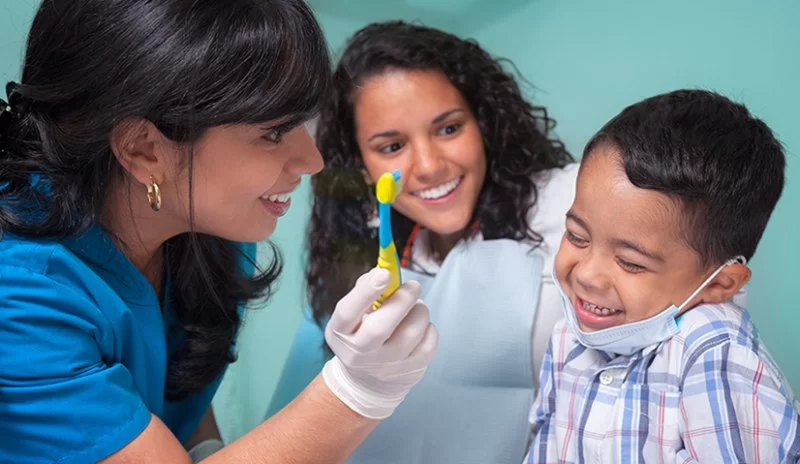
- building-healthy-habits-from-a-young-age
- the-role-of-parents-and-educators-in-childrens-dental-health
- real-stories-how-oral-health-education-made-a-difference
- long-term-benefits-of-early-dental-awareness
- challenges-in-teaching-kids-about-oral-hygiene
- why-dentistry-toothtruth-supports-dental-education
1. Building Healthy Habits from a Young Age
1.1 Brushing and Flossing as Daily Rituals
Children who learn to brush and floss early are more likely to carry these practices into adulthood. Oral health education empowers them to understand not just the “how” but the “why” behind dental hygiene. Making toothbrushing part of a morning and bedtime ritual can transform it from a chore into a natural part of daily life.
1.2 Teaching Through Fun and Engagement
Using colorful toothbrushes, playful songs, or story-based lessons engages kids in ways traditional education can't. Turning brushing time into a game often leads to better cooperation and deeper retention. Kids love challenges—so why not make oral care one they can win?
2. The Role of Parents and Educators in Children's Dental Health
2.1 Consistency Begins at Home
Parents are the first role models. When children observe adults brushing after meals, visiting dentists regularly, and speaking positively about dental care, they mimic these behaviors. It’s not just about instructions—it’s about visible actions.
2.2 Schools as a Platform for Awareness
Dental health campaigns in schools—such as “Tooth Day” events or visits from local dental professionals—offer a chance to normalize dental care and make it accessible. When lessons are reinforced across multiple settings, they stick better and reach more children.
3. Real Stories: How Oral Health Education Made a Difference
3.1 Maya’s Turnaround
Maya, a 7-year-old in Michigan, used to dread brushing. After her school hosted a dental awareness week and gave every child a “tooth hero” sticker book, she became excited about brushing each tooth. Within six months, her dentist noted a dramatic improvement in gum health.
3.2 From Cavities to Confidence: Liam’s Journey
Liam had four cavities by age six. His parents admitted they didn’t prioritize brushing. After attending a local parenting seminar on children's oral health, they implemented structured brushing times. At his next check-up, Liam was cavity-free and proud to show off his “sparkly teeth.”
4. Long-Term Benefits of Early Dental Awareness
4.1 Lower Risk of Chronic Issues
Educating children about proper oral care early reduces the chances of periodontal disease, misaligned teeth, and chronic bad breath in later years. Good habits protect not just teeth, but self-esteem and financial well-being as well.
4.2 Better Overall Health Outcomes
Oral health is tightly linked to cardiovascular health, diabetes management, and even respiratory conditions. Teaching children to value their oral hygiene helps them understand the larger picture of personal health and responsibility.
5. Challenges in Teaching Kids About Oral Hygiene
5.1 Overcoming Fear and Resistance
Many kids fear dental visits or associate brushing with discomfort. Creative tools like storybooks featuring brave dental characters or allowing them to “brush the doll’s teeth” first can shift their perception from fear to fun.
5.2 Addressing Misinformation and Myths
Some families still believe baby teeth aren’t important since they fall out. This misconception leads to neglect. Educators and dental professionals must clarify that early decay can affect speech, diet, and the health of permanent teeth below.
6. Why Dentistry Toothtruth Supports Dental Education
At Dentistry Toothtruth, we believe that prevention starts with education. We support parents, teachers, and healthcare providers in spreading awareness about children’s dental care. Through community workshops, educational materials, and friendly services, we help children embrace oral health from their first tooth to their adult smile.
Helping kids learn about their teeth is not just about avoiding cavities—it's about empowering the next generation to live healthier, happier lives. Visit Dentistry Toothtruth to explore how our services can help you raise dental-smart children.







 Southside Orthodontics - Your Colonial Heights and Chesterfield Orthodontist4.0 (274 review)
Southside Orthodontics - Your Colonial Heights and Chesterfield Orthodontist4.0 (274 review) Gentle Dental Moreno Valley4.0 (147 review)
Gentle Dental Moreno Valley4.0 (147 review) Small World Dental - Pediatric Dentist and Orthodontist4.0 (1469 review)
Small World Dental - Pediatric Dentist and Orthodontist4.0 (1469 review) Oakwood Dental Arts4.0 (470 review)
Oakwood Dental Arts4.0 (470 review) John D. Meola, DDS5.0 (4 review)
John D. Meola, DDS5.0 (4 review) Embrace Orthodontics0.0 (0 review)
Embrace Orthodontics0.0 (0 review) The Importance of Oral Health Education During Pregnancy for a Healthy Pregnancy
The Importance of Oral Health Education During Pregnancy for a Healthy Pregnancy Best Tips for Brushing Your Teeth Properly for Healthy Gums: Essential Techniques for Oral Health
Best Tips for Brushing Your Teeth Properly for Healthy Gums: Essential Techniques for Oral Health Why Skipping Dental Checkups Can Lead to Bigger Oral Health Problems
Why Skipping Dental Checkups Can Lead to Bigger Oral Health Problems Advantages of Porcelain Dental Restorations
Advantages of Porcelain Dental Restorations How Can Diabetes Cause Tooth and Gum Problems? Preventing and Managing Oral Health Issues
How Can Diabetes Cause Tooth and Gum Problems? Preventing and Managing Oral Health Issues Healthy Habits for Promoting Good Oral Health and Hygiene: Tips for a Healthy Smile
Healthy Habits for Promoting Good Oral Health and Hygiene: Tips for a Healthy Smile